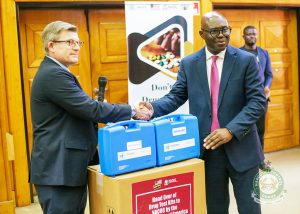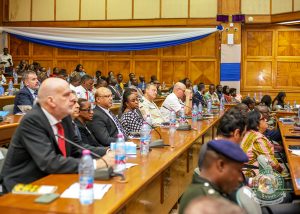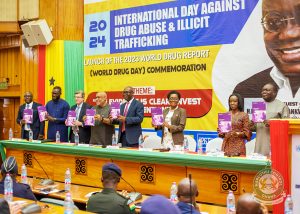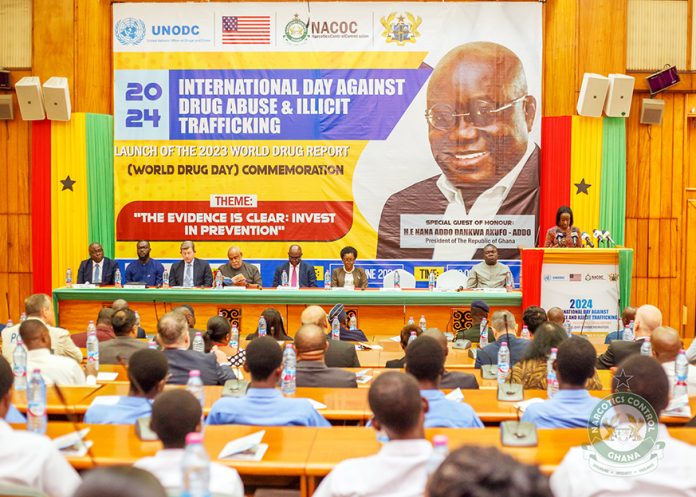The World Drug Report 2024 has revealed that the alarming diversification of local drug markets in Africa poses a growing public health crisis and serious challenges to law enforcement.
 According to the report, which was launched on Wednesday, June 26, 2024 by the UN Office on Drugs and Crime (UNODC), the local drug markets in Africa are rapidly diversifying, shifting from a predominance of domestically sourced cannabis to a multitude of transiting drugs such as cocaine, heroin, methamphetamine and pharmaceutical opioids.
According to the report, which was launched on Wednesday, June 26, 2024 by the UN Office on Drugs and Crime (UNODC), the local drug markets in Africa are rapidly diversifying, shifting from a predominance of domestically sourced cannabis to a multitude of transiting drugs such as cocaine, heroin, methamphetamine and pharmaceutical opioids.
The report also said the diversification is exacerbating existing health challenges, particularly as the availability of drug treatment services is limited in West Africa.
The regional launch of the World Drug Report 2024 happened in Accra, Ghana, as part of the celebrations for the International Day Against Drug Abuse and Illicit Trafficking, slated for June 26 each year.
STATISTICS
Between January 2019 and June 2024, at least 126.4 tons of cocaine were seized, en route or from West Africa, mainly in international waters in the Gulf of Guinea (30.8 tons), in Cabo Verde (18.2 tons).
 Senegal (15.7 tons) and Guinea (5.6 tons). This has led to a surge in drug consumption and dependency within local communities. Cocaine, which was previously believed to only transit the region, is increasingly used, with the number of people entering treatment for cocaine rising.
Senegal (15.7 tons) and Guinea (5.6 tons). This has led to a surge in drug consumption and dependency within local communities. Cocaine, which was previously believed to only transit the region, is increasingly used, with the number of people entering treatment for cocaine rising.
HEALTH RISK
The report said new mixtures and concoctions, such as Kush, Khadafi and Monkey Tail, pose severe health risks due to their unknown and varied compositions.
According to the limited available data, these mixtures contain, among other ingredients, various controlled drugs, pharmaceuticals, alcohol and solvents.
 “To effectively address these threats, it is essential to increase the scientific testing capacity of regional laboratories, enabling the prompt detection and analysis of their components. This approach will bolster the ability of law enforcement and health agencies to respond to and mitigate emerging drug threats effectively.
“To effectively address these threats, it is essential to increase the scientific testing capacity of regional laboratories, enabling the prompt detection and analysis of their components. This approach will bolster the ability of law enforcement and health agencies to respond to and mitigate emerging drug threats effectively.
The evidence is clear: investing in drug prevention saves lives by protecting communities from the harmful effects of drugs,” said Dr. Amado Philip de Andrés, Regional Representative at the UNODC Regional Office for West and Central Africa.
“It also weakens criminal groups by reducing the profits they generate from people’s addictions.”
CLARION CALL
In a speech read on his behalf by the Minister for the Interior, Henry Quartey, the President, Nana Addo Dankwa Akufo-Addo, made a clarion call to all Ghanaians, including civil society organisations, faith-based organisations, traditional authorities, non-governmental organisations, and individual citizens, to lend support to the law enforcement agencies in the fight against the drug canker.
 Touching on the theme for this year’s International Drug Day, “The evidence is clear: investing in drug prevention”, the President Akufo-Addo observed that it seeks to raise awareness about the importance of treating people with drug use disorders (DUD) with respect, providing voluntary services devoid of discrimination and stigmatisation, offering alternatives to punishment for people who use drugs and prioritising prevention through drug demand reduction, among others.
Touching on the theme for this year’s International Drug Day, “The evidence is clear: investing in drug prevention”, the President Akufo-Addo observed that it seeks to raise awareness about the importance of treating people with drug use disorders (DUD) with respect, providing voluntary services devoid of discrimination and stigmatisation, offering alternatives to punishment for people who use drugs and prioritising prevention through drug demand reduction, among others.
While acknowledging that Ghana had not been spared by the impact of drug trafficking, drug abuse, and attendant health problems, he opined that it was heartwarming to state that Ghana acknowledged the challenges with the implementation of international and domestic drug policies, particularly for the health and safety of Ghanaian society.
 He indicated that the government was unwaveringly committed to the common and shared responsibility of addressing and countering the global drug problem.
He indicated that the government was unwaveringly committed to the common and shared responsibility of addressing and countering the global drug problem.
“In demonstrating commitment to ensuring the good health and safety of people, Ghana has taken bold steps in reforming the country’s drug policies by enacting the Narcotics Control Commission Act, 2020 (Act 1019),” he remarked.
COLLABORATE
The Director-General, Narcotics Control Commission (NACOC), Mr. Kenneth Adu-Amanfoh in his welcome address, indicated that the agency he leads is tirelessly engaging and collaborating with its partners to establish Drop-In Centers in some regional capitals.
 He explained that these centers will offer counselling services to persons suffering from Substance Use Disorders (SUDs), providing the critical support needed for recovery from addiction.
He explained that these centers will offer counselling services to persons suffering from Substance Use Disorders (SUDs), providing the critical support needed for recovery from addiction.
Mr. Adu-Amanfoh stated that NACOC was committed to ensuring that a scientific evidence-based approach was used in developing prevention outreach programmes that are tested and effective in dealing with drug use among youth.
 “NACOC is also resolute in ensuring the public health and safety of all Ghanaians. As we commemorate this day, it is crucial to acknowledge the relentless efforts of our law enforcement agencies, healthcare professionals, educators, and civil society organisations in tackling this global issue,” he added.
“NACOC is also resolute in ensuring the public health and safety of all Ghanaians. As we commemorate this day, it is crucial to acknowledge the relentless efforts of our law enforcement agencies, healthcare professionals, educators, and civil society organisations in tackling this global issue,” he added.








